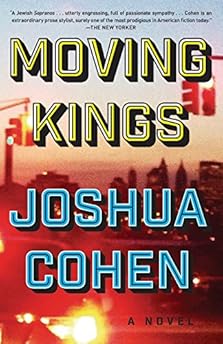« older | Main Largehearted Boy Page | newer »
August 29, 2018
Joshua Cohen's Playlist for His Novel "Moving Kings"
In the Book Notes series, authors create and discuss a music playlist that relates in some way to their recently published book.
Previous contributors include Jesmyn Ward, Lauren Groff, Bret Easton Ellis, Celeste Ng, T.C. Boyle, Dana Spiotta, Amy Bloom, Aimee Bender, Heidi Julavits, Hari Kunzru, and many others.
Joshua Cohen's brilliant novel Moving Kings is a masterpuece that solidifies his place as one of our finest young writers.
The New Yorker wrote of the book:
"A Jewish Sopranos . . . utterly engrossing, full of passionate sympathy . . . Joshua Cohen is an extraordinary prose stylist, surely one of the most prodigious at work in American fiction today."
In his own words, here is Joshua Cohen' Book Notes music playlist for his novel Moving Kings:
"The year is 2015, and twenty-one-year-olds Yoav and Uri, veterans of the last Gaza War, have just completed their compulsory military service in the Israel Defense Forces. In keeping with national tradition, they take a year off for rest, recovery, and travel. They come to New York City and begin working for Yoav’s distant cousin David King—a proud American patriot, Republican, and Jew, and the recently divorced proprietor of King’s Moving Inc., a heavyweight in the tri-state area’s moving and storage industries. Yoav and Uri now must struggle to become reacquainted with civilian life, but it’s not easy to move beyond their traumatic pasts when their days are spent kicking down doors as eviction-movers in the ungentrified corners of the Bronx, Brooklyn, and Queens, throwing out delinquent tenants and seizing their possessions. And what starts off as a profitable if eerily familiar job—an 'Occupation'—quickly turns violent when they encounter one homeowner seeking revenge."
That's what my publisher wrote about my novel, Moving Kings, and it's pretty much as correct and complete as cover-copy gets. If there's anything missing, actually, it's exactly what's missing from all marketing jargon and promo-ese: "the music."
A few phrases about this phrase: "The music" of prose can be a prosaic drag to define, but typically it's taken to indicate a certain purposeful lyricism, which—the more and more purposeful it gets—becomes whatever's the opposite of lyricism: mere-icism? It's the use of the devices that we're taught to identify in school in the writing of others and are urged to employ in our own school "themes" and "compositions," and that once we're graduated we gradually learn never to use, because what job—what boss—would tolerate an emailed meeting agenda ample with assonance and consonance and aureate alliteration and the rhythmic periodicities of prosodic feet from Greek and Latin?
Another way to put all this is: Because of the way we're educated (with verse first, and with sentences and paragraphs second and third and fourth and for the rest of our lives), most of us grow up convinced that "the music" of prose is poetry that's somehow out of place and out of time; illegal, denaturalized poetry that has lost its documents and so must evade enjambment by crossing state-lines, into a hostile foreign territory into which it can't assimilate—it's too "poetic"—and yet from which it can't be expelled without tempting incoherence. Incomprehension. Senselessness.
That, at least, is how I see it: "the music" of prose as prose's native alien.
That is how I hear it, in my own writing: "My music," such as it is, is just the sound of all the other languages that I've lived in, and that my family has lived in, claiming through this language their right to a home.
###
I never listen to music while writing: how can anyone listen and, at the same time, expect to make music of their own? (It's like trying to talk while—drinking? eating? "performing" oral sex?)
So what's below are just a few of the songs that were on whenever I wasn't writing between 2015 and 2017:
Shmulik Kraus, Shishi Ham (trans. "Hot Friday"): The Hebrew title is also an anagram, and an anaphone, of "hashish."
Nechi Nech, Melech HaRap Shel HaMizrach HaTichon (trans. "King of Mediterranean Rap"): A nonserious attempt to wage a rap war as a substitute for serious and endless war-war.
Bas Sheva, Lust: Mid-twentieth-century American Jewry didn't let Bernice Kanefsky become a cantor, so she changed her name to Bas Sheva and became a goddess.
Elmo Hope, Elmo's Blues: The truth-telling here only begins with the title.
Smiley Lewis, I Hear You Knocking (But You Can't Come In): Lewis should've sung this when Fats Domino stopped by and robbed him blind.
Dabke, Dabke 1 and Dabke 2: Dabke is a traditional Arabic group-dance and the name of a music collective that I know nothing about, except: these two albums they made are boss.
Joshua Cohen and Moving Kings links:
the author's website
the author's Wikipedia entry
Los Angeles Times review
New York Times review
New Yorker review
Largehearted Boy playlist by the author for Four New Messages
Los Angeles Review of Books interview with the author
Oxonian Review interview with the author
also at Largehearted Boy:
Support the Largehearted Boy website
Book Notes (2015 - ) (authors create music playlists for their book)
Book Notes (2012 - 2014) (authors create music playlists for their book)
Book Notes (2005 - 2011) (authors create music playlists for their book)
my 11 favorite Book Notes playlist essays
Antiheroines (interviews with up and coming female comics artists)
Atomic Books Comics Preview (weekly comics highlights)
guest book reviews
Librairie Drawn & Quarterly Books of the Week (recommended new books, magazines, and comics)
musician/author interviews
Note Books (musicians discuss literature)
Short Cuts (writers pair a song with their short story or essay)
Shorties (daily music, literature, and pop culture links)
Soundtracked (composers and directors discuss their film's soundtracks)
weekly music release lists






